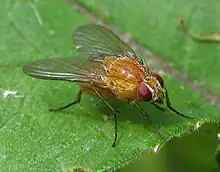| Phaonia pallida | |
|---|---|
 | |
| Phaonia pallida, Female | |
| Scientific classification | |
| Domain: | Eukaryota |
| Kingdom: | Animalia |
| Phylum: | Arthropoda |
| Class: | Insecta |
| Order: | Diptera |
| Family: | Muscidae |
| Subfamily: | Phaoniinae |
| Tribe: | Phaoniini |
| Genus: | Phaonia |
| Species: | P. pallida |
| Binomial name | |
| Phaonia pallida (Fabricius, 1787) | |
| Synonyms | |
| |
Phaonia pallida, the muscid fly or orange muscid fly, is a species of fly in the family Muscidae.[1]
Distribution and habitat
This species is distributed across parts of the Palearctic – Europe (including Sicily and the Azores), Russia, and Asia (Israel, Turkey, and Iran).[2][3] These flies mainly inhabit deciduous forests and woodland, especially spruce forest edge.[4][5]
Description
.JPG.webp)
Phaonia pallida can reach a length of about 5.5–7.9 millimetres (0.22–0.31 in). These flies have an orange body with a very hairy thorax.[4][5] The antennae are composed by three articles and bear a feathery arista. The legs and the balancers are yellow, while the tarsi are black. The eyes are dark red, separated by a yellow marking in the females, while in males they are very close to each other.[6]
Biology
Adults fly from May to September, feeding on nectar of flowers (especially of Heracleum sphondylium).[4][5][6] Its larvae have been found growing in various fungi (Amanita rubescens, Clitocybe nebularis, Paralepista flaccida, Xerula radicata, Hymenopellis radicata, Amanita muscaria) [6] but also in rotten wood and under tree bark.[5][7] The last larval instar of Phaonia pallida is carnivorous, feeding on small insects.[5][8]
Bibliography
- Chandler, Peter J. (2010). A Dipterist's Handbook (2nd Edition). The Amateur Entomologist. 15. Orpington, Kent, England: Amateur Entomologists' Society. pp. 525pp
- D'Assis Fonseca, E.C.M (1968). Diptera Cyclorrhapha Calyptrata: Muscidae. Handbooks for the Identification of British Insects. 10. London.: Royal Entomological Society of London. pp. 118pp.
- Gregor, F.; Rozkosny, R.; Bartak, M.; Vanhara, J. (2002). The Muscidae (Diptera) of Central Europe. Scientiarum Naturalium Universitatis Masarykianae Brunensis. 107. Masaryk.: Masaryk University. pp. 280pp.
References
- ↑ BioLib
- ↑ Catalogue of life
- ↑ Fauna europaea
- 1 2 3 Nature Spot
- 1 2 3 4 5 J.K. Lindsey Commanster
- 1 2 3 Un monde dans mon jardin
- ↑ Chandler, Peter J. (2010). A Dipterist's Handbook. The Amateur Entomologist. Vol. 15 (2nd ed.). Orpington, Kent, England: Amateur Entomologists' Society. pp. 525pp.
- ↑ Jan Sevck Diptera (excluding Mycetophilidae S. str.) associated with fungi in Czech and Slovak Republics: a survey of rearing records from 1998-2000
 Data related to Phaonia pallida at Wikispecies
Data related to Phaonia pallida at Wikispecies Media related to Phaonia pallida at Wikimedia Commons
Media related to Phaonia pallida at Wikimedia Commons